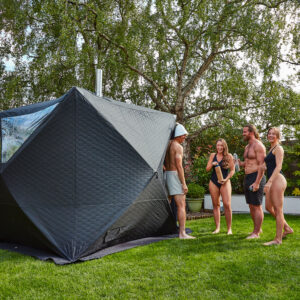
Ice Baths: A Key to Enhanced Recovery and Vitality for Athletes
Explore how ice baths can boost recovery and enhance vitality for athletes. Discover practical tips and insights to elevate your performance. Read more!
Spend Over £500 To Get Free UK Delivery - Excludes Certain Postcodes & Round Ice Baths

Cold water swimming, also known as winter swimming, involves swimming outdoors such as in a lake, river or sea.
Swimming in cold water is becoming a very popular pastime, not just for athletes, but people looking for pain relief can experience a sense of reinvigoration, physically and mentally, by using cold water immersion.
What do you need to know about cold water swimming and how can it benefit you?
Swimming in cold water has a number of health benefits. Going in cold water can have a positive impact on the mind as well as the body.
Being exposed to cold water through cold water immersion can help to stimulate parts of the body while also providing a sense of reinvigoration, which is why there has been a major rise in people getting out of their comfort zones by cold water swimming or taking regular ice baths.
There are a number of great health benefits to swimming in cold water:
The impact of cold water on the immune system has been studied widely.
Cold water immersion can boost the white blood cells count because the body is being forced to react to the temperature, meaning it becomes better at activating its defences.
An increase in white blood cells means a healthier immune system, so you are less likely to experience illnesses like colds and can fight off infection.
Because exposure to cold water flushes your capillaries, arteries, and veins, forcing blood to the surface, this warms your extremities so your body naturally learns how to adapt to the cold.
As cold water swimming places a degree of physical and mental stress on the body, cold water immersion can result in you reducing your stress response and building resilience over time.
For anybody that has experienced the “cold water shock,” where the cold temperatures immediately place our bodies under stress, you will know that the cold water can be a big surprise.
But the amazing fact is that our bodies can become used to cold water. The psychological stress associated with the cold water means that we can slowly become acclimatised to it the more we expose ourselves to it. This process of becoming “cold adapted” takes time, but is one of the worthwhile benefits of cold water swimming as we can take this into other areas of our lives.
Additionally, people who are used to cold water are calmer and more relaxed in many other aspects of their lives. This is because they have learned the process of cold adaptation and have slowly stimulated their parasympathetic nervous system, which is the state of relaxation in the human body.
Traditionally, cold water was seen to be a way to dampen down any sexual urges.
Because cold water boosts testosterone and oestrogen production, this increases libido, which can result in higher self-esteem, more confidence, and an enhanced mood.
Anybody not used to experiencing cold water it’s important to remember that it is okay, depending on a number of variables:
An individual’s tolerance.
The water temperature.
The safety precautions.
The swimmer’s health and fitness levels.
Because cold water can be a major shock to the system, can cause gasping of breath, as well as hypothermia, it can be extremely dangerous to those not already used to cold water exposure, if not practiced with care.
It’s important to remember that tolerance is crucial and building this up is important, which can be done over time, and with a variety of practices, such as cold showers or having an ice bath.
It’s worth noting that many experienced swimmers will only spend a few minutes at a time in the water during winter because it is so cold.
If you want to go cold water swimming you’ve got to be aware of the potential for hypothermia.
General advice recommends that the absolute minimum temperature for anybody swimming in a wetsuit is 12 degrees Celsius, and in these temperatures, the swims need to be very short.
It’s also important to note that there are risks for hypothermia even when you exit the water. If you feel cold for longer than 10 minutes when in the cold water, get out of the water and get warm as soon as possible.
When swimming in cold water, unless you have extensive experience and additional safety measures in place, 15 minutes is the absolute maximum amount of time before you exit the water to warm back up.
Always listen to your own body, every day is different and dependent on many variables including how much you have eaten, what you have eaten, are you tired, how cold is the water, is the water moving and how well adapted you are. It is a great opportunity to tap into our primal instinct and connection to our bodies.
It is always safest and most effective to experience a tolerable amount of discomfort consistently rather than a considerable/dangerous amount infrequently.
When you get out of the water, get dried as soon as you can, making sure you have dry clothes and a hot drink nearby is essential to make sure you bring your core body temperature up as quickly as possible.
When starting out, it’s important to remember that you need to acclimatise to this practice very slowly.
The best way to do this is to have a dip at least once a week. You can then build up to extending your time in the water. If you are not comfortable at any time, or you feel your body getting numb, you need to get out as soon as you can and focus on getting warm and increasing blood flow.
Additionally, you should not set specific goals for staying in the water, not least at the outset due to many variables, such as your fitness levels, as well as the time of year.
There is a big difference between cold water swimming in the summer and cold water swimming in the winter. It is easier to start in the summer when the water temperatures are 16 degrees Celsius and above.
Ensuring you have a healthy attitude is just as important as the length of time you spend in the water.
Cold water immersion has been touted as an incredibly beneficial practice for a number of ailments. Having a cold shower every day can help to create endorphins produced by the autonomic nervous system.
Because of the effect of cold water on your circulation and your hormones, it can help you to deal with anxiety. Predominantly, this is because you are placing stress on the body. This is why it’s so important to start any cold water swimming practice gradually.
Cold water stimulates a lot in the body and mind, especially when you feel that initial cold shock when getting into the water for the first time. So this may mean you may feel more anxiety symptoms than normal, for example, rapid breathing, but this is why you need to take a slow and controlled approach.
It can help improve the parasympathetic nervous system response, but it can take time. Allow your body the time it needs.
When we expose the human body to cold water, it can train the body to burn fat quickly.
This is because cold water immersion can also activate brown fat which is a type of fat that’s only activated when we get cold.
Brown fat produces heat to maintain our body temperature which means we burn more calories, and it increases your basal metabolic rate which also burns calories after swimming .
There are many locations where you can go open water swimming in the wild. Many people opt for lakes that are already frequented by cold water swimmers.
But it’s important to remember that you need to be safe, so going into the ocean when you are not an experienced swimmer and do not have the fitness levels is not recommended.
It’s also important to keep an eye on the weather conditions, because a change in the wind direction can increase the size of a wave and if the temperature drops, this can immediately have a bearing on your physical strength. This is because cold water immersion affects your physical recovery, which is why you may benefit from gradual exposure to cold water swimming.
It’s also important to go somewhere where you can stick close to shore just in case you get tired.
When undergoing cold water immersion, some of the essentials include the following:
Many people have experienced an increased sense of vitality because of cold water swimming. For the many health benefits associated with cold water therapy, it’s something that we could all benefit from. However, it’s important to remember that while taking an icy dip can be amazing for your nervous system and your health, it is important to do it safely.

Founder of Urban Ice Tribe

Explore how ice baths can boost recovery and enhance vitality for athletes. Discover practical tips and insights to elevate your performance. Read more!

There’s nothing quite like the raw, elemental power of a pop-up sauna. Portable, authentic, and deeply restorative, it’s the perfect way to reconnect with nature and yourself. But to take your sauna ritual to the next level, the right sauna accessories can make all the difference.

Transform your outdoor space into a personal wellness retreat with the Urban Ice Tribe Sauna Tent. This detailed setup guide walks you through every step, from unboxing to your first steam session, blending practical instruction with the mindful ritual of heat therapy.
Helping men & women release anxieties & limiting beliefs to experience a life of freedom using powerful breathwork, cold water therapy, movement & sound healing.

No spam, notifications only about new products, updates, offers and announcements.